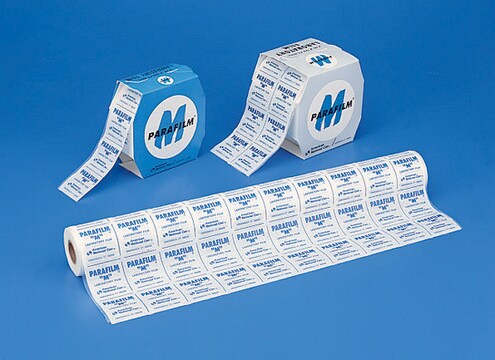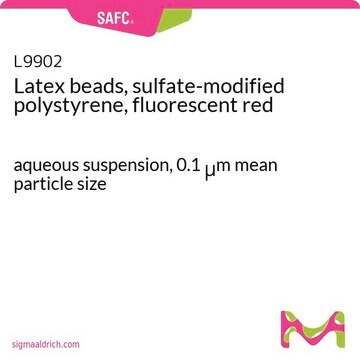Recommended Products
material
film (thermoplastic)
sterility
non-sterile
packaging
pack of 1 ea
manufacturer/tradename
Parafilm PM998
parameter
-45-+50 °C temp. range
W × L
50 cm × 16 m
roll size
20 in. × 50 ft
Looking for similar products? Visit Product Comparison Guide
Related Categories
General description
PARAFILM stretches up to 200% and clings even around irregular shapes and surfaces. The sealing film is free of plasticizers and consists primarily of polyolefins and paraffin waxes. PARAFILM M is resistant up to 48 hours against many polar substances, eg saline solutions, inorganic acids and alkaline solutions.
Protect the integrity of research applications with a tight moisture-barrier that holds a strong seal and doesn′t release from glassware, despite off-gassing
Reduce the risk of tampered data with a covering that is odorless, colorless and semi-transparent
Prevents moisture and volume loss due to material composition and tight seal
Flexible and self-sealing material allows it to cling around irregular shapes and surfaces
Stretches more than 200% of original length
Resistant up to 48 hours against many polar substances such as saline solutions, inorganic acids and alkaline solutions
Permeability
Oxygen: (ASTM 1927-98) 150 cc/m² d at 23°C and 50% RH
Carbon Dioxide: (Modulated IR Method) 1200 cc/m² d at 23°C and 0% RH
Water Vapor: (ASTM F1249-01)
Flat: 1 g/m² d at 38°C and 90% RH
Creased: 1 g/m² d at 38°C and 90% RH
Effects of Common Reagents
Potassium Permanganate
5%: No apparent effect except permanent dark brown coloration in 18 hours
0.1%: Same as 5% except slightly less color
Iodine solution (0.1N)
No effect except staining brown in 18 hours
Ethyl Alcohol (95%)
No apparent effect except some face whitening in 24 hours
No apparent effect in 24 hours:
Hydrochloric Acid conc. (12N) dil. (5N)
Sulphuric Acid conc. (36N) dil. (5N)
Nitric Acid conc. (16N) dil. (5N)
Sodium Hydroxide conc. (22%)
Ammonium Hydroxide conc. (28% NH<sub>3</sub>)
Salt (NaCl) solution (20%)
Isopropyl Alcohol (99%)
Not recommended for use with chlorinated, non-polar aliphatic and aromatic solvents
Film becomes soft and sticky at about 130° to 150°F (54° to 66°C)
Protect the integrity of research applications with a tight moisture-barrier that holds a strong seal and doesn′t release from glassware, despite off-gassing
Reduce the risk of tampered data with a covering that is odorless, colorless and semi-transparent
Prevents moisture and volume loss due to material composition and tight seal
Flexible and self-sealing material allows it to cling around irregular shapes and surfaces
Stretches more than 200% of original length
Resistant up to 48 hours against many polar substances such as saline solutions, inorganic acids and alkaline solutions
Permeability
Oxygen: (ASTM 1927-98) 150 cc/m² d at 23°C and 50% RH
Carbon Dioxide: (Modulated IR Method) 1200 cc/m² d at 23°C and 0% RH
Water Vapor: (ASTM F1249-01)
Flat: 1 g/m² d at 38°C and 90% RH
Creased: 1 g/m² d at 38°C and 90% RH
Effects of Common Reagents
Potassium Permanganate
5%: No apparent effect except permanent dark brown coloration in 18 hours
0.1%: Same as 5% except slightly less color
Iodine solution (0.1N)
No effect except staining brown in 18 hours
Ethyl Alcohol (95%)
No apparent effect except some face whitening in 24 hours
No apparent effect in 24 hours:
Hydrochloric Acid conc. (12N) dil. (5N)
Sulphuric Acid conc. (36N) dil. (5N)
Nitric Acid conc. (16N) dil. (5N)
Sodium Hydroxide conc. (22%)
Ammonium Hydroxide conc. (28% NH<sub>3</sub>)
Salt (NaCl) solution (20%)
Isopropyl Alcohol (99%)
Not recommended for use with chlorinated, non-polar aliphatic and aromatic solvents
Film becomes soft and sticky at about 130° to 150°F (54° to 66°C)
Legal Information
Parafilm is a registered trademark of Bemis Company, Inc.
Choose from one of the most recent versions:
Certificates of Analysis (COA)
Lot/Batch Number
It looks like we've run into a problem, but you can still download Certificates of Analysis from our Documents section.
If you need assistance, please contact Customer Support.
Already Own This Product?
Find documentation for the products that you have recently purchased in the Document Library.
Celia Jimenez-Sanchez et al.
Frontiers in microbiology, 9, 1667-1667 (2018-08-31)
Many microbes relevant to crops, domestic animals, and humans are transported over long distances through the atmosphere. Some of these atmospheric microbes catalyze the freezing of water at higher temperatures and facilitate the onset of precipitation. We collected microbes from
Akiko Hirao et al.
PloS one, 4(9), e6909-e6909 (2009-09-10)
The peripheral circadian clock in mice is entrained not only by light-dark cycles but also by daily restricted feeding schedules. Behavioral and cell culture experiments suggest an increase in glucose level as a factor in such feeding-induced entrainment. For application
Our team of scientists has experience in all areas of research including Life Science, Material Science, Chemical Synthesis, Chromatography, Analytical and many others.
Contact Technical Service






